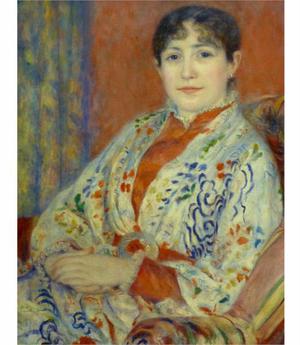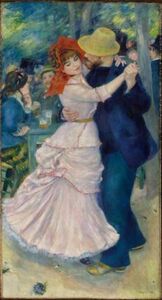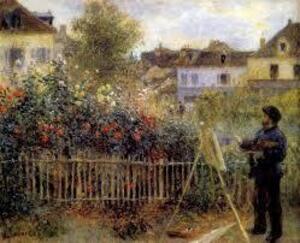Renoir
Reading Toward Renoir II
Tuesday, July 16, 2013

Renoir, Madame Hériot, 1882
I find that in reading Jean Renoir’s Renoir, my father, I am thinking of Maxim Gorki’s memoir of Chekhov, a most beautiful reminiscence. In particular of a story I have always loved, and which has to be quoted complete with Gorki’s introductory meditation. It is as follows:
I think that in Anton Chekhov’s presence everyone involuntarily felt in himself a desire to be simpler, more truthful, more one’s self; I often saw how people cast off the motley finery of bookish phrases, smart words, and all the other cheap tricks with which a Russian, wishing to figure as a European, adorns himself, like a savage with shell’s and fish’s teeth. Anton Chekhov disliked fish’s teeth and cock’s feathers; anything” brilliant” or foreign, assumed by a man to make himself look bigger, disturbed him; I noticed that whenever he saw any one dressed up in this way, he had a desire to free him from all that oppressive, useless tinsel and to find underneath the genuine face and living soul of the person. All his life Chekhov lived on his own soul; he was always himself, inwardly free, and he never troubled about what some people expected and others – coarser people – demanded of Anton Chekhov. He did not like conversations about deep questions, conversations with which our dear Russians so assiduously comfort themselves, forgetting that it is ridiculous, and not at all amusing, to argue about velvet costumes in the future when in the present one has not even a decent pair of trousers.
Beautifully simple himself, he loved everything simple, genuine, sincere, and he had a peculiar way of making other people simple.
Once, I remember, three luxuriously dressed ladies came to see him; they filled his room with the rustle of silk skirts and the smell of strong sent; they sat down politely opposite their host, pretended they were interested in politics, and began “putting questions”: “Anton Pavlovich, what do you think? How will war end?”
Anton Pavlovic coughed, thought for a while, and then gently, in a serious and kindly voice, replied: “Probably in peace.”
“Well, yes… certainly. But who will win? The Greeks or the Turks?”
“It seems to me that those will win who are the stronger.”
“And who, do you think, are the stronger?” the ladies asked together.
“Those who are the better fed and the better educated.”
“Ah, how clever,” one of them exclaimed.
“And whom do you like best?” another asked.
Anton Pavlovich looked at her kindly, and answered with a meek smile: “I love candied fruits… don’t you?”
“Very much,” the lady exclaimed gaily.
“Especially Abrikossov’s,” the second agreed solidly. And the third, half closing her eyes, added with relish: “It smells so good.”
And all three began to talk with vivacity, revealing, on the subject of candied fruit, great erudition and subtle knowledge. It was obvious that they were happy at not having to strain their minds and pretend to be seriously interested in Turks and Greeks, to whom up to that moment they had not given a thought.
When they left, they merrily promised Anton Pavlovich: “We will send you some candied fruit.”
“You managed that nicely, “ I observed when they had gone.
Anton Pavlovich laughed quietly and said: “Everyone should speak his own language.”
[Maxim Gorky, Reminiscences of Tolstoy, Chekhov, and Andreyev. With an introduction by Mark Van Doren. Translator not given. New York: Viking Press, 1959, pp74-76.
Although the translator’s name is, astonishingly, nowhere given in the volume, I assume the translation is a good one and that the tiny hint of condescension in “not having to strain their minds,” is Gorki’s, though perhaps, under the influence of Chekhov, the younger writer felt no such thing and it is at the further remove of translation that the note has entered the composition. I am certain, though, and in part from reading this passage of Gorki’s, that the feeling is not Chekhov’s, as it seems it would not be Renoir’s. Chekhov’s idea of a person may be more complicated than Renoir’s – it does seem that the regrets and struggles of his figures have more bitterness in them – but, as in Renoirs, there is the sense in the stories that it is natural for people to be themselves, and that the task of the painter or the writer is to help them to circumstances in which they are.


